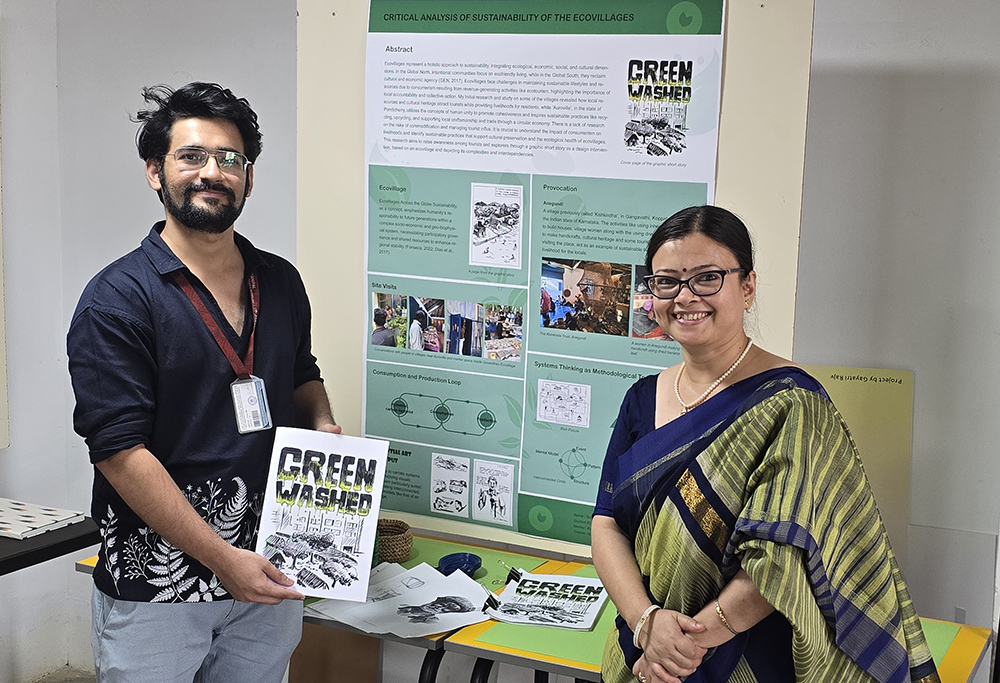Socio-Ecological-Technical Transformation (SETT) Lab aims to redefine the connection between place, ecology, and society amid the planetary crisis.
Socio-Ecological-Technical Transformation Lab (SETT- Lab)
The research on sustainability transitions claims that social and environmental challenges demand transformative change, but many socio-technical frameworks have a reductionist approach and treat nature passive backdrop. This Trans-disciplinary Research space argues for a socio-ecological-technical approach that better integrates environmental factors. Socio-Ecological-Technical Transformation (SETT) Lab aims to redefine the connection between place, ecology, and society amid the planetary crisis. Located at the intersection of climate justice, decolonial knowledge systems, and design intervention, it will examine how future-focused worldbuilding can arise through radical and holistic imagination and interconnecting collaborations that include more-than-human entities.
Vision
At SETT Lab, we envision sustainable ecological transformation as a cultural and relational journey, going beyond technical frameworks. We aim to create a collaborative space that uses speculative design and storytelling to promote interconnectedness and well-being for all living beings. Committed to co-creating innovative solutions with stakeholders, we engage in critical reflection through experimental methods. Finally, we are dedicated to integrating social narratives with technical processes effectively.
Pricipal Investigator:
Dr Keya Chakraborty
Research area
More-than-human design
Well-being
Decolonial knowledge systems
Climate justice
Ecological ethics
Speculative design and Worldbuilding
Intermediaries of transformation
Participatory & cartographic mapping and storytelling.
Research Enquiries
- What roles do intermediaries, including artists, designers, activists, and various stakeholders, play in promoting holistic community well-being through transformative practices, particularly in relation to diverse and sustainable ecological futures?
- How do socio-economic, technical, and ecological systems interact to shape sustainability transformation in place-based contexts (like Auroville) through interactions and feedback loops?
- In what ways do indigenous and local knowledges challenge anthropocentric ecological narratives? How can relational ontologies (e.g., inter-being, kinship with land) be embedded in ecological transition practices?
Recent publications
- Ghosh, B., Velasco, D., Chakraborty, K., Mguni, P., Yuana, S.L. (2025). Transformative Innovation Policy: An Analytical Review of Key Methods and Challenges. Annual Review of Environment and Resources. Vol. 50. doi: https://doi.org/10.1146/annurev-environ-111523-102251.
- Rana, D., Chakraborty, K., Kalyansundaram, S. (2025). Spatio-Artistic Thresholds Foster Human-Nature Connections for Sustainable Transitions: Cases of Vernacular Facades in Bhal, India. Frontiers in Sustainable Cities – Sustainable Infrastructure. doi: 10.3389/frsc.2025.1533006.
- Chakraborty, K. (2024). Mapping the maze: A methodological framework for studying inequality through diverse lenses. In Bhandari, M. Social inequality: Past, present, and Nova Science Publishers, Inc., pp. 37-7
- Srinivasan, L. & Chakraborty, K. (2024). An Interdisciplinary Pedagogy for Environmental Design and Community Resilience During the Pandemic. Advances in 21st Century Human Settlements. Springer, pp. 1113-1125.
Overview of some of the recent Capstone projects (M.Des)
Title: Critical Analysis of the Sustainability of Ecovillages
Student Name: Siddhesh Parag Tamhane
Year: 2025.
Research brief: This research tries to unpack the impact of consumerism on livelihoods and identify sustainable practices that support cultural preservation and the ecological health of ecovillages. It aims to raise awareness among tourists and explorers through a graphic novel as a design intervention, narrating a story based on an ecovillage and depicting its complexities within it.
Title: Designing for Tomorrow: More than Human Design for Sustainable Coexistence
Student Name: Lisha Thimmaiah
Year: 2024.
Research brief: This research explores the link between unchecked human-centric design and global human-animal conflicts. It examines community engagement and co-creation in More than Human Design to assess participatory methods for educational, sustainable solutions with a focus on Anegundi and Kodagu regions in Karnataka.
Title: Transitions in Rural Tourism: Introducing Agro-tourism to Anegundi
Student Name: Ajay Puthran
Year: 2023
Research brief: This research-based design project examines Agrotourism for the development of new economies in the transitioning touristic rural region of Hampi (Village-Anegundi), Karnataka. It proposes a toolkit that explores the leverage point of socio-economic transitions
Outreach & Conferences
• 4th World Conference of the Society for Urban Ecology (SURE) at Y1ld1z Technical University, Istanbul, Turkey, July 16-19, 2025:
Paper title: Beyond Human-Centric Design: Towards a Pluriverse Approach in Urban Design.
• 31st International Sustainable Development Research Society (ISDRS) conference on Sustainability and Beyond, July 2024, Budapest, Hungary:
- Paper title: Transformation of Traditional Doll Making Communities: A Case Study of Sustainable Art and Culture Practice from Southern India
Authors: Anuditha & Dr. Keya Chakraborty - Paper title: Critical Analysis of Economic Sustainability of Ecovillages: Balancing Tourism and Resource Management, Case Studies from India
Authors: Siddhesh Parag Tamhane & Dr. Keya Chakraborty - Community Transformation Through Design Innovation: An Indian Perspective on Resilience and Sustainability
Authors: Siddhesh Gupte & Dr. Keya Chakraborty.
•30th International Sustainable Development Research Society (ISDRS) conference on Linking Futures of Mountain and Ocean, June 2024, Kathmandu, Nepal:
- Paper title: How sustainable tourism empowers community and conservation: Perspectives from Rural India
Authors: Ajay Puthran & Dr. Keya Chakraborty - Paper title: Coexistence amidst Modernisation: More-than-Human design for Sustainable Futures
Authors: Lisha Thimmaiah & Dr. Keya Chakraborty - Paper title: Reimagining design for Sustainability: Biophilic design as a framework for documenting human-nature transitions in vernacular dwellings
Authors: Divyarajsinh Rana, Dr. Keya Chakraborty & Dr. Srisrividhiya Kalyanasundaram
• 15th International Sustainability Transitions (IST) conference on Sustainability Transitions and Nature, June 2024, Oslo, Norway:
- Paper Title: Transformative Innovative Policy for democratic, decolonial and sustainable futures: methods, measures, and outstanding Questions: Authors: Bipashyee Ghosh, Diana Velasco, Keya Chakraborty, Patience Mguni, Suci Lestari Yuana
- Paper title: Reconnecting Humans with Nature: Reimagining traditional Indian art & architecture for sustainability transitions
Authors: Divyarajsinh Rana, Dr. Keya Chakraborty & Dr. Srisrividhiya Kalyanasundaram
• Globelics International Conference, October 2023, Tiruvananthapuram, Kerala:
Track name: Innovation-Driven Knowledge-Economies and Transformation in the Global South
One of the panelists: Dr. Keya Chakraborty.
• Reimagining Transitions: Beyond Established Methods and Concepts, July 2023, Leibniz Institute of Ecological, Urban and Regional Development. Dresden, Germany:
- Paper Title: Reimagining Architectural Transitions: More than human approach towards transitions in vernacular architecture.
Authors: Divyarajsinh Rana, Dr. Keya Chakraborty & Dr. Srisrividhiya Kalyanasundaram - Paper Title: Irrigation Systems in the face of Modernisation Induced Transitions: A case study of the Vijayanagara Empire.
Authors: Lisha Thimmaiah, Dr. Keya Chakraborty - Paper Title: Preservation of Intangible Cultural Heritage: Reimagining transitions in a tourism-driven heritage space
Authors: Siddhesh Gupte, Dr. Keya Chakraborty - Paper Title: Balancing the goals of sustainable community wellbeing and habitat restoration in managed retreat proposals: a perspective from the Indian Sundarbans: Dr. Keya Chakraborty & Prof. Lance Manuel, University of Texas (Austin)
- Paper Title: Empowering communities and promoting sustainable development through tourism: The Case of Hornbill Festival of Nagaland in India: Syed Akhteruzzaman, Lisbon, Portugal & Dr. Keya Chakraborty
• The 29th International Sustainable Development Research Society Conference (ISDRS), July 2023, University Kebangsaan, Malaysia
- Paper Title: Fostering resilience through strategies within small-scale rural community in transition: Insights from India
Author: Dr. Keya Chakraborty - Paper Title: Analysing the cultural heritage conservation to attain cultural sustainability: Insights from India
Author: Nithya Ayyaswamy Chettiar, Dr. Keya Chakraborty
• 13th International Sustainability Transitions Conference IST 2022, November 2022, STRN
Paper title: Framework for a new avenue of urban sustainability transition in Global South – Case study India
Presenter: Dr. Keya Chakraborty.
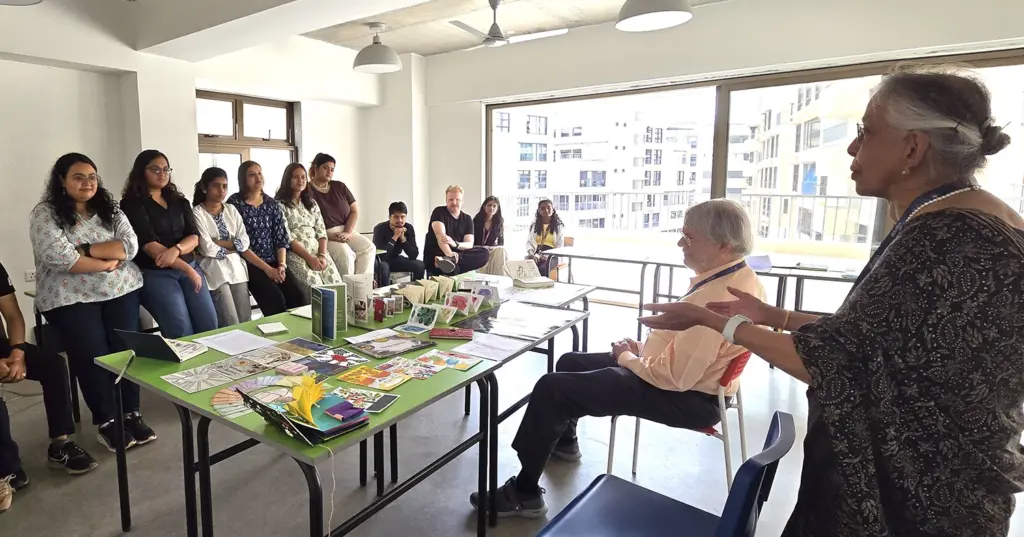
A thoughtful discussion with Robert Barrass and Prof. Dr. Shobhana Madhavan
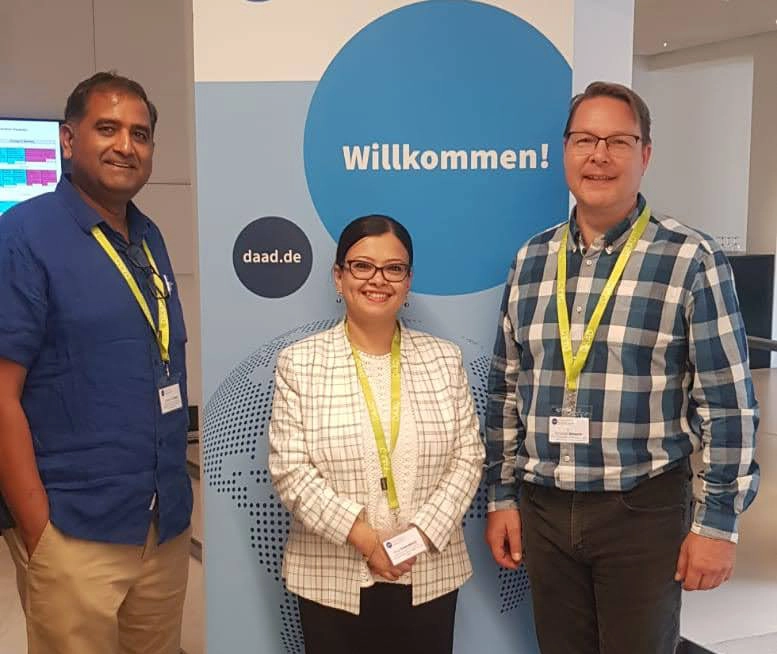
With Collaborators Dr. Christoph Woiwode and architect Lalit Kishor Bhati in Berlin.
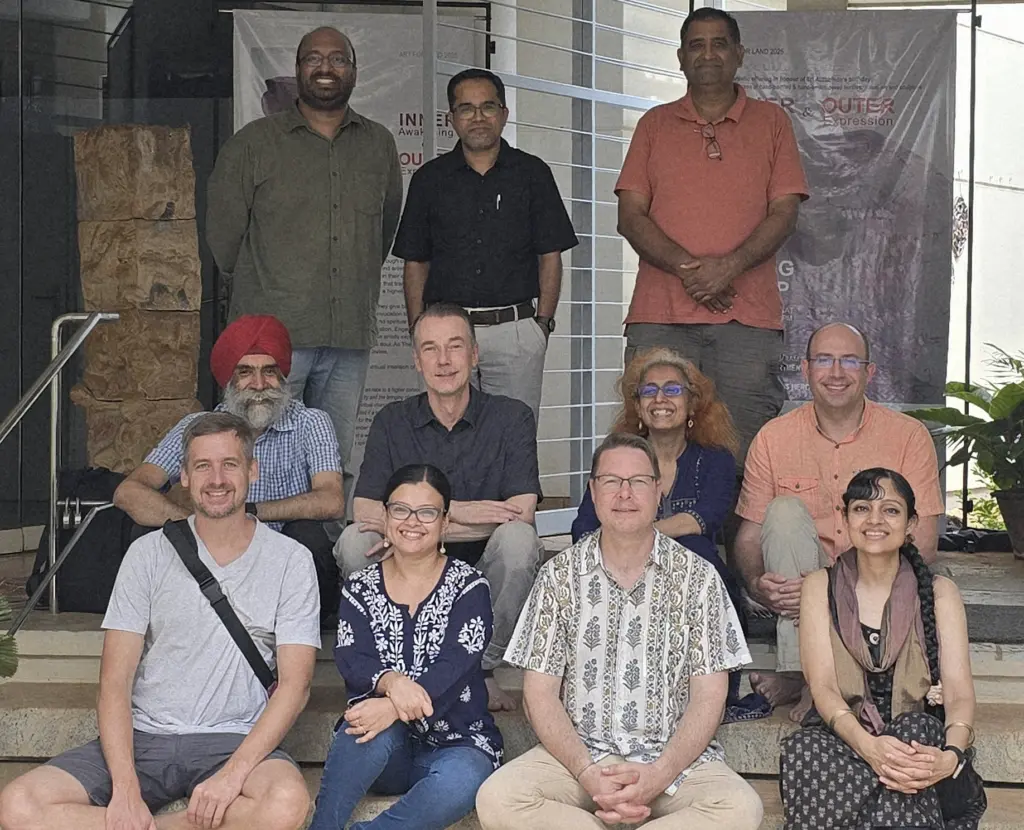
Collaborative workshop of SETT Lab with distinguished collaborators.
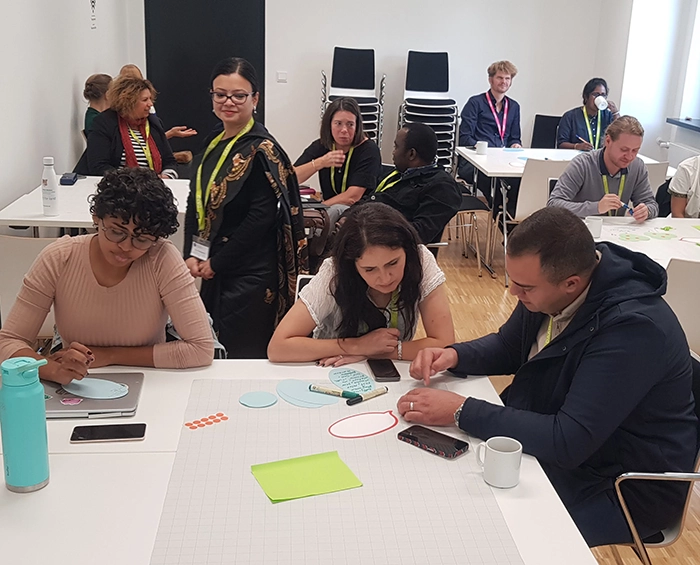
DAAD workshop on inner transformation in Germany.

ISDRS Conference, 2024 MDes students and PhD scholars. presented their work on sustainability.
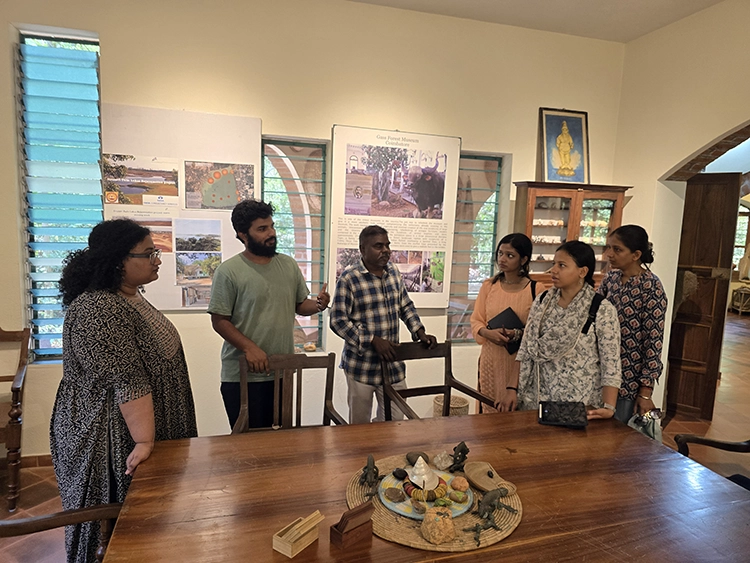
Understanding Human Nature relationship at Pitchandikulam with experts.
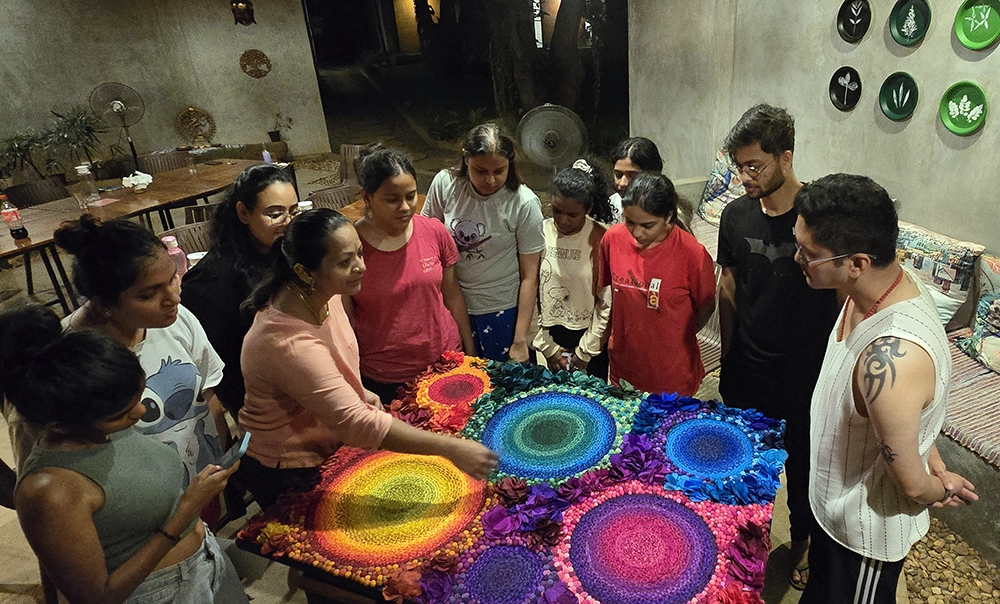
With artist Manjula Selvam and her artwork, Auroville.
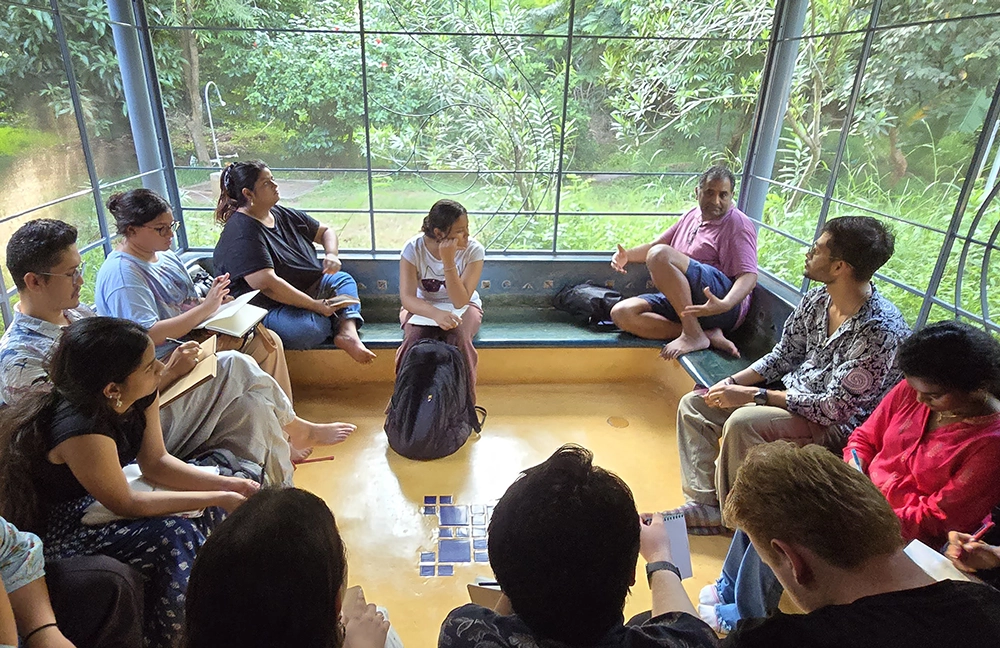
Brainstorming session on the philosophical perspectives of integral learning – with Architect Lalit Kishor Bhati at Nandanam kindergarten, Auroville.
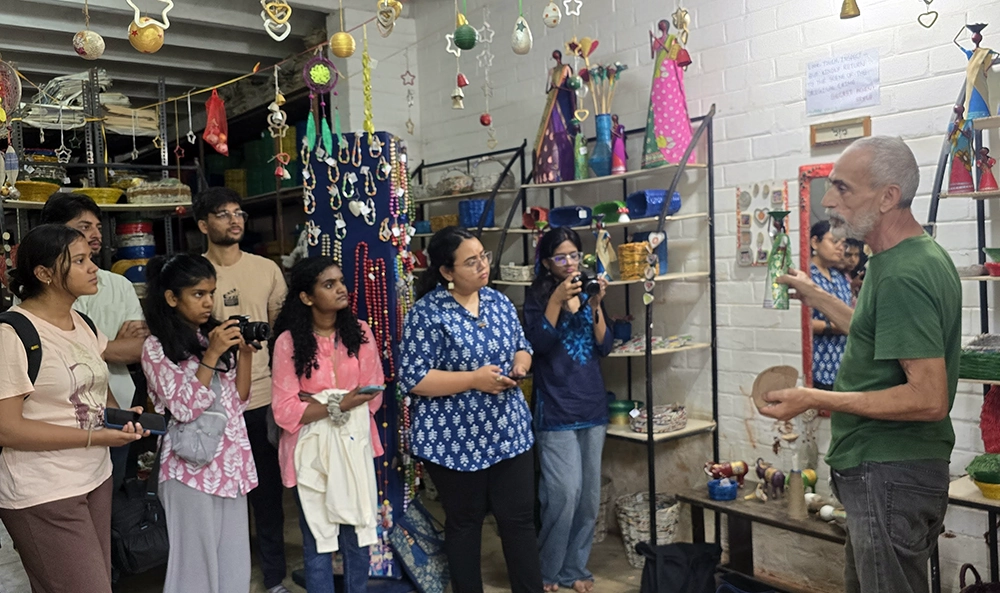
Students exploring recycled materials at Well Paper, Auroville.
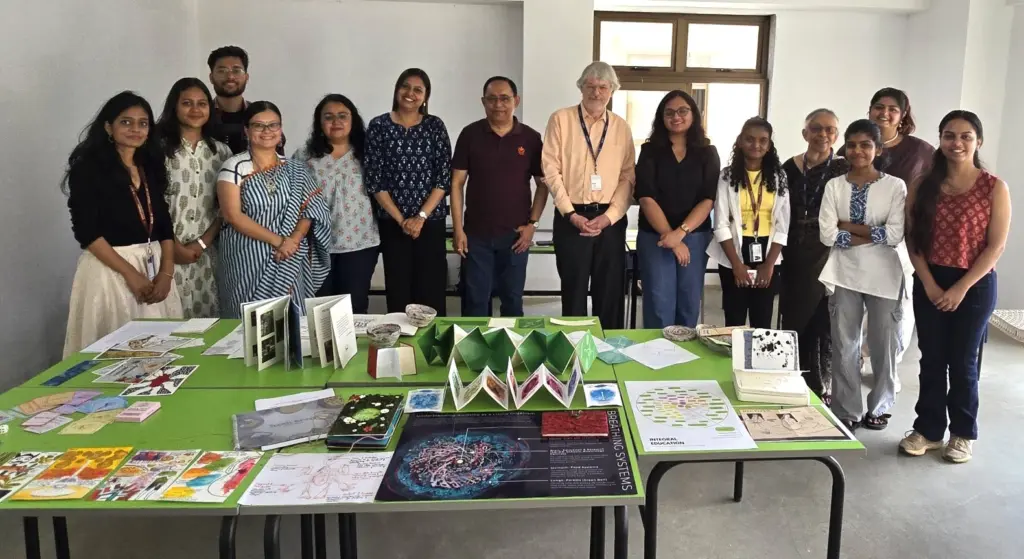
Students showcasing their research insights and project outcomes to the visiting delegates and the director of SMI.

